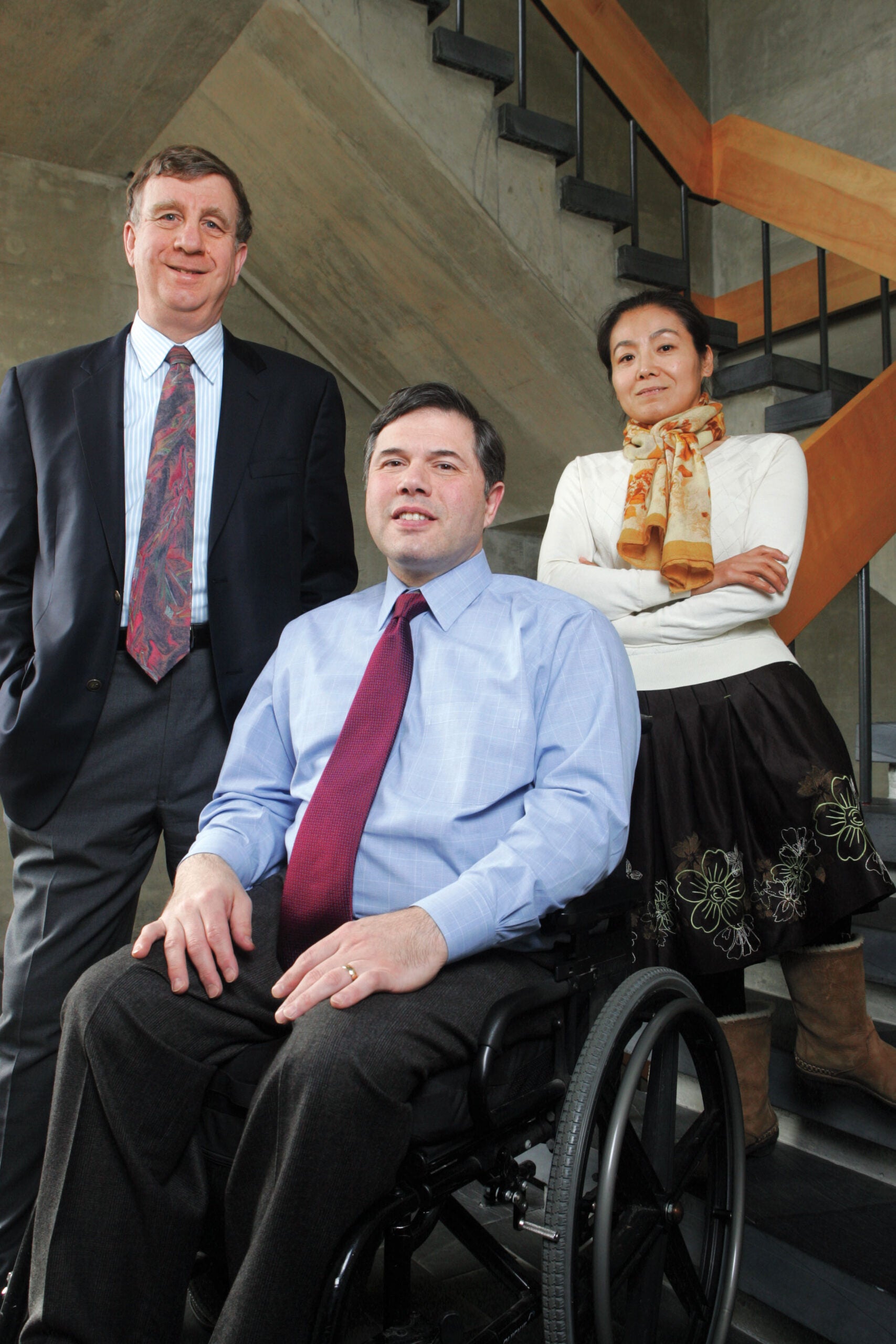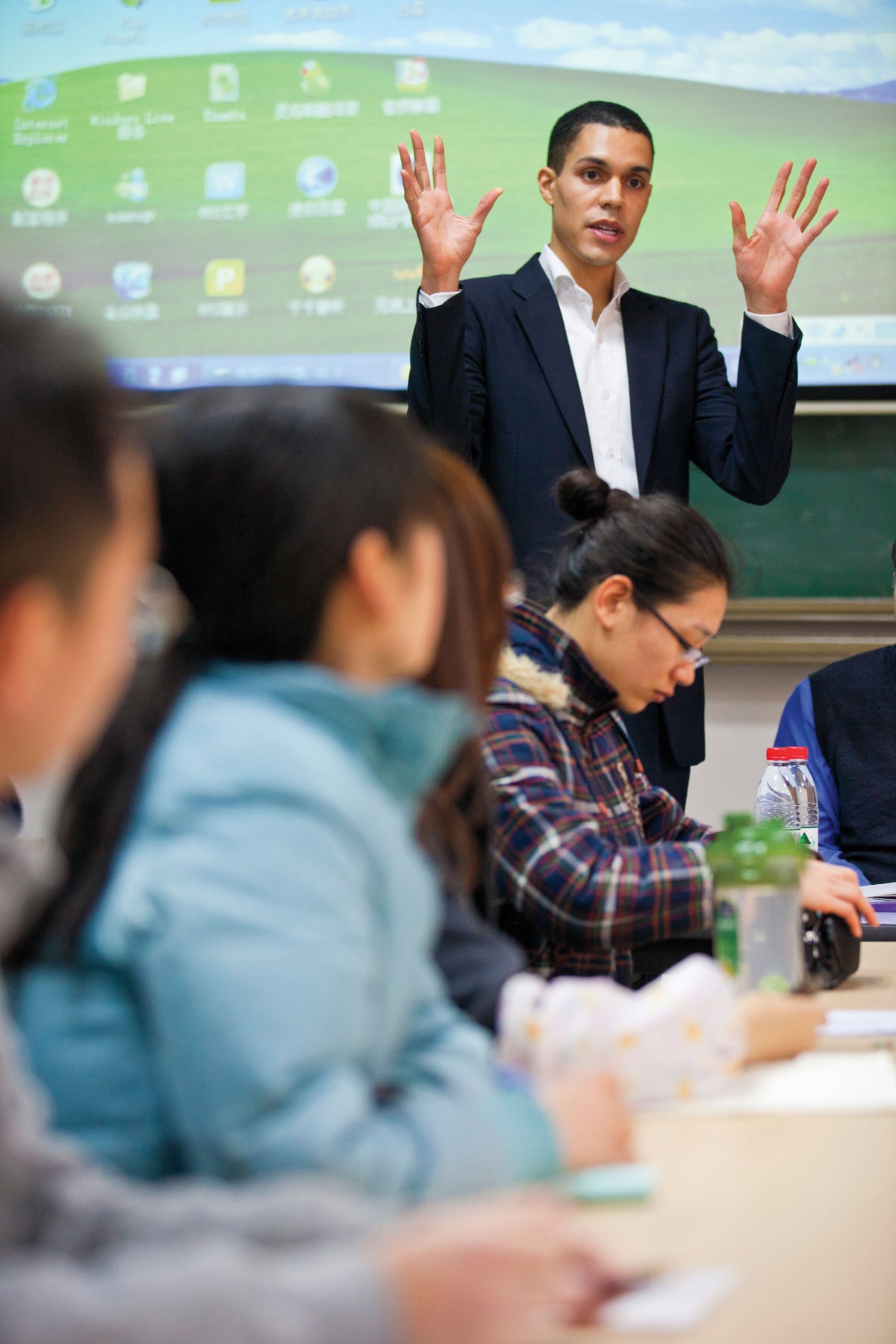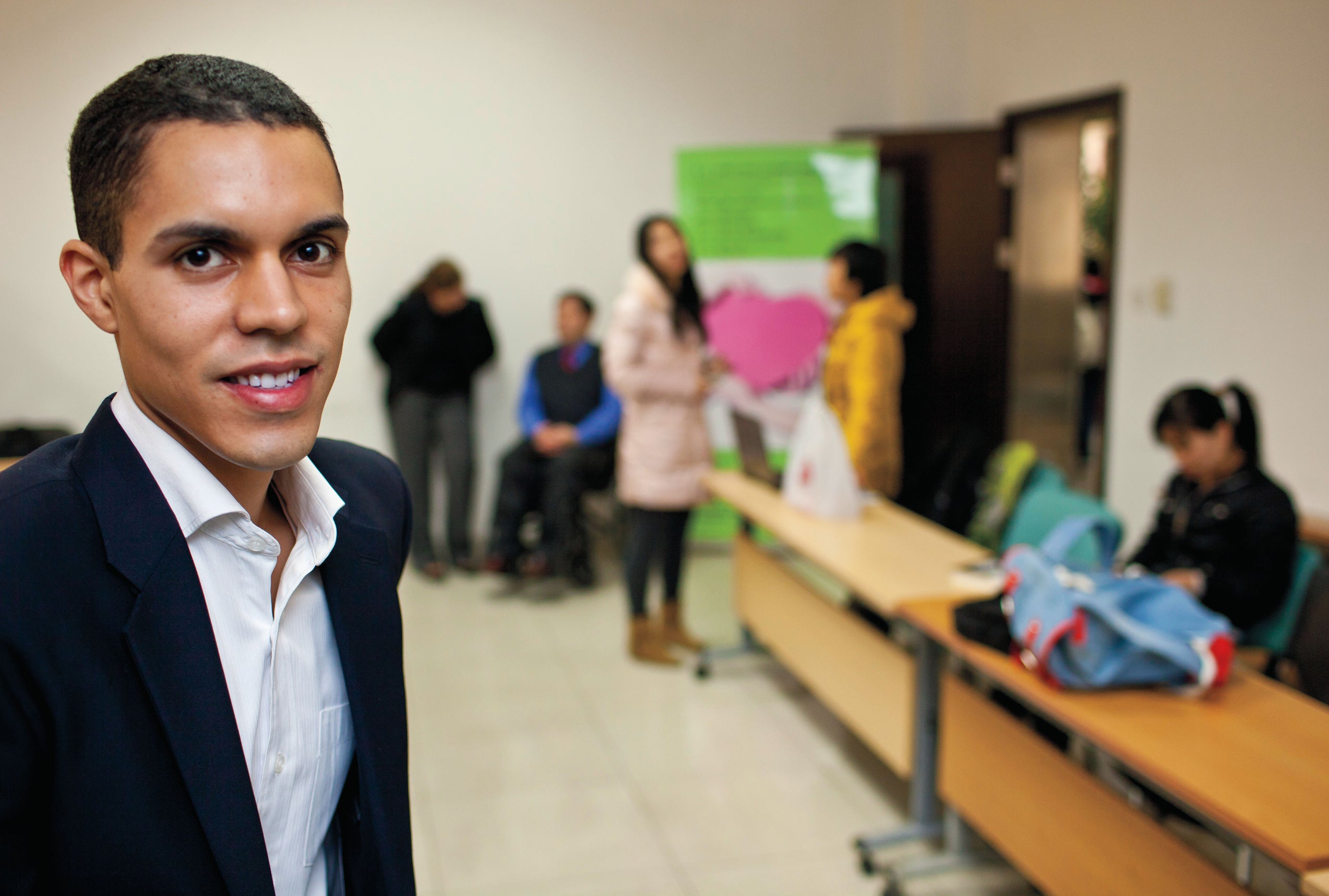
At least 675 million people in the world have physical, intellectual or psychosocial disabilities, and many struggle for basic human rights including education and physical safety. In some countries, disabled children are not allowed to enroll in school or are segregated from other children. Women with disabilities are more likely to be sexually abused, and their complaints often are disregarded by authorities. Many nations offer no accommodations to or assistance for people with disabilities. And even among families and well-meaning international aid organizations, the needs of disabled people are widely ignored or misunderstood.
The Harvard Law School Project on Disability is on a fast track toward changing the treatment of people with disabilities around the world. Co-founded in 2004 by HLS Professor William P. Alford ’77 and Visiting Professor Michael Stein ’88, professor at William & Mary Law School, HPOD has huge ambitions. “We want to transform things entirely,” says Stein, now the project’s executive director. Stein first began to work with Alford, an expert on Chinese law and disability rights, after they were introduced by now-Dean Martha Minow, who herself has written and worked on disability law.
Collaborating with governments at the highest levels and working directly with people with disabilities, HPOD has made great progress in just a few years in promoting disability human rights worldwide. It has initiatives in China, Bangladesh, the Philippines, South Africa, Korea, Vietnam and other countries—all conducted on a pro bono basis. It has filed six amici briefs with the European Court of Human Rights—among them, one last year that helped overturn a law in Hungary that prevented people with disabilities from voting, in a case brought by Jan Fiala LL.M. ’10. (See profile.) HPOD has helped place HLS students in jobs at the U.S. Department of Justice’s division on Americans with disabilities and has hosted conferences, workshops and seminars at HLS. Last summer, in HPOD’s first internship program, five Harvard undergraduates traveled to Bangladesh to work on disability rights. They produced reports, including two on violence against women with disabilities, that were adopted by the U.N. special rapporteur on violence against women and by the U.N. special rapporteur on disability.
Perhaps most significantly, HPOD has played an important role in the U.N. Convention on the Rights of Persons with Disabilities, adopted in 2006. Stein was instrumental in the convention’s drafting and adoption (he co-wrote a forthcoming book on the convention), and he and Alford have worked to foster its implementation throughout the world. So far, more than 145 nations have signed and more than 95 nations (plus the European Union) have ratified the convention, which is the first global human rights treaty of the 21st century and the most rapidly negotiated human rights treaty in the history of international law.
As its work becomes known, the project finds its services in huge demand. “We are inundated with more requests from across the world than we can possibly handle,” says Alford. Right now, they are concentrating their efforts in two places: Bangladesh, and China, where Alford, vice dean for the HLS Graduate Program and International Legal Studies and director of East Asian Legal Studies, has traveled regularly for 33 years.
In 2007, Alford and Stein organized the PRC’s first conference on disability law, in conjunction with Renmin University of China and the China Disabled Persons’ Federation, which was then headed by Deng Pufang, the son of China’s late leader Deng Xiaoping and himself a person with a disability. At the conference, attended by scholars from China and abroad, Stein—widely regarded as the world’s foremost expert on comparative disability law—and scholars from several other nations gave a global overview of the legal rights of disabled people. The goal was never to dictate a vision to China but instead to provide leaders there with a range of models from which to choose, and also to help them fashion their own, says Alford. Critical to its success is that HPOD approaches its work with deep humility and respect for the people with whom it works. “This is not something we are doing for China or for people with disabilities, but rather with them, and we are learning an enormous amount in the process,” Alford emphasizes.

2007 also marked the Special Olympics World Summer Games in Shanghai, an undertaking involving more than 7,500 athletes with intellectual disabilities that Alford, who is a member of Special Olympics International’s board of directors, helped organize. Since then, HPOD has continued to build on the conference’s success, by working with its local partners in China, hosting a second conference on disability law last October, advising on law reform, nurturing China’s first generation of legal academics with an interest in disability issues, and training other educators, families and people with disabilities. It also worked with Renmin University to establish China’s first disability law clinic. “We are expanding our funding and programming and allies in a culturally and politically appropriate manner,” says Alford, whose long-standing connection to China has been very helpful in getting traction for the project. “Every time I go to China, people ask me, ‘What are you, as a professor from Harvard, working on?’ When I say, ‘disability issues,’ it helps draw attention to an area that has not received much attention.”
In addition to Alford and Stein, two others make up the key team in China. (In Cambridge, Juliet Bowler has been the project’s administrative linchpin.) Fengming Cui, who received her Ed.D. in special education from Boston University, joined HPOD in 2008 and is the director of its China program. Cui brings personal experience to her work: A polio survivor, she was initially denied the opportunity to go to college in China, her homeland, because of her disability. “I took this path with a very deep heart, not only because of my own experience but because I believe disability work in China is not just for people with disabilities” but advances the cause of human rights generally, she says. Cui has worked with parents of disabled children in China to help them understand their rights and to help remove the shame that some feel about their children. Alonzo Emery ’10, who worked as a newspaper reporter in China before matriculating at HLS, is now an assistant professor at Renmin University of China Law School, where he helps run the disability law clinic, serving, he says, “the nation’s most deserving—and awe-inspiring—citizens.” An alumnus of the Harvard Negotiation & Mediation Clinical Program, Emery also teaches a course on alternative dispute resolution that helps students consider the role of ADR in resolving disability-related and other disputes.
This winter term, Yilin Xu ’12 interned for credit at the clinic under Emery’s supervision, studying comparative legal frameworks for disabled students on a project commissioned by the Chinese Ministry of Education as it moves its education system to an inclusive one for disabled students. He also worked with local and international NGOs on disability rights including consumer rights for visually impaired people. And Charles Wharton ’12 volunteered with HPOD last summer in Beijing, doing a series of corporate social responsibility profiles on companies that have a good track record of hiring people with disabilities. He also co-wrote, with Cui, an academic article about disability rights in China and the challenges there in implementing the U.N. convention. Wharton will return to China this summer to continue his work.
While their efforts are focused on the rights of the disabled, the consequences are more far-reaching, they say.“Achieving rights for people with disabilities, often the most marginalized members of society, improves the lives and circumstances of other excluded groups closer to the mainstream,” says Stein, who uses a wheelchair and was the first person with a known disability on the Harvard Law Review. “If you include people with disabilities, you likely are also including other vulnerable populations such as the poor, migrants and ethnic minorities.”
Stein and Alford find this area of work very gratifying. “I have faced challenges throughout my life but also have been enormously blessed with opportunities,” says Stein. “Disability law is a vehicle through which I try to enable the flourishing of other people with disabilities, at home and abroad.”
Alford says, “I think each of us has both gifts and limitations, and it is immensely gratifying to try to enlist whatever gifts I may have to try to help others realize their gifts.” Adds Stein, “Academics tend to think about abstract concepts. To contribute in even a small way to a real person’s existence is wonderful.”
